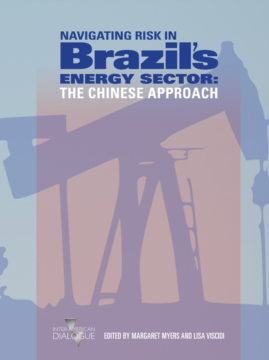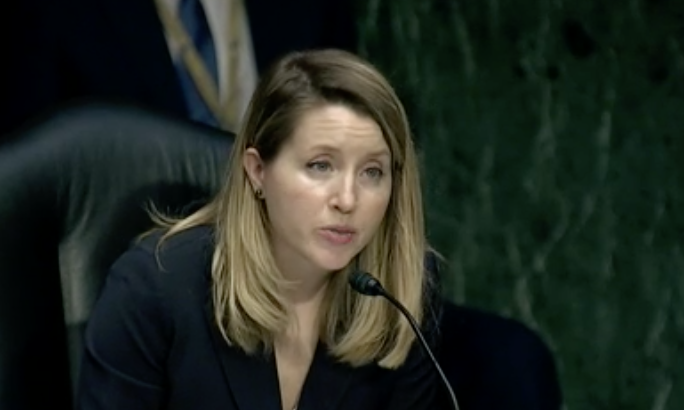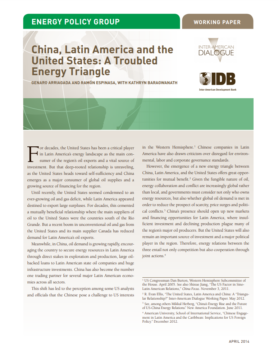
Navigating Risk in Brazil’s Energy Sector
Brazil’s oil and gas and electricity sectors are an important destination for Chinese direct investment.
Good morning. I would like to thank Chairman Kaine, Ranking Member Rubio, and the other distinguished subcommittee members for the opportunity to be here today.
The Latin American and Caribbean region has never been a top priority region in China’s foreign policy—it was the last to be included, after the Arctic, in the Belt and Road Initiative (BRI).
And yet, after two decades now of extensive economic and political engagement, China has, over time, established a degree of influence over aspects of decision-making in many parts of the region.
Most of this influence is indirect—it comes from strong economic ties and occasional dependence on China’s export market. With economics in mind, Latin American governments have a vested interest in accommodating China where possible.
As a result, we’ve seen some countries adjust regulations to attract more Chinese investment—and even evidence of effects on democratic governance, as some leaders feel at liberty to erode democratic institutions, knowing that they will still be able to access Chinese capital even if they do so.
Other influence is more direct in nature, aimed at shaping views of China and of China’s positions on wide-ranging policy matters.
We are seeing a major push to grow educational exchanges, media outreach, security cooperation, tech policy coordination, and outreach to established and up-and-coming officials and policymakers—all of which are intended to grow China's soft power across the region.
In other cases, China has used the tools at its disposal to advance political aims. Vaccines were used to reward or discourage decision-making on Taiwan, for example. In my view, these actions marked a clearer than ever departure from China’s policy of noninterference in the regions.
We all know that there are multiple competing commitments right now, but unless we play more effectively in the Latin American region, we have little chance of competing effectively.
China’s influence is not automatic, of course. Some countries have pursued resource governance policies and policies of diversification that help them to avoid dependence on any one partner.
In others, like Mexico, China’s economic influence is negligible. And even in countries such as Venezuela and Cuba which depend heavily on Chinese assistance, officials in those countries have sometimes resisted some of China’s many proposals.
On another note, I’d suggest China-US competition in Latin America need not be entirely zero sum, but in practice China’s approach to deal-making, its courting of local officials, and delivery of often heavily-subsidized goods and services—has is many cases limited prospects for US companies and others.
China’s growing economic leverage also increasingly limits the US ability to promote certain policy priorities in the region, including in the area of democratic governance.
The US government, US policymakers, and individual companies have worked hard to address what many perceive to be an increasingly competitive investment environment and to strengthen hemispheric ties, but there is more that needs to be done.
Looking ahead, I naturally recommend even more engagement with Latin America, starting with a focus on making the Summit of the Americas a success. We all know that there are multiple competing commitments right now, but unless we play more effectively in Latin America, we have little chance of competing effectively.
As China’s activity in the region evolves—and it is evolving very rapidly—US policy and messaging must evolve accordingly.
We must also make clear that our Latin America policy is focused on enhancing U.S.-Latin America cooperation, based on shared interests—and not just motivated by U.S. competition with China, or US domestic politics.
I would also say that as China’s activity in the region evolves—and it is evolving very rapidly—US policy and messaging must evolve accordingly.
There are some important areas of continuity in the China-LAC dynamic. The region remains of critical importance to China’s food and energy security, and is a critical market for China’s high-value-added goods, but we are now seeing and important focusing of Chinese investment and trade activity in a specific set of industries, which are mostly high tech and innovation related.
China’s engagement is also localizing. We are seeing more connections forged at very local levels in Latin America and by wide-ranging actors. This has facilitated Chinese engagement during some of the very earliest phases of project development.
The China-Latin America financial relationship is also evolving in important ways.
And then, finally, we must consider Latin American and Caribbean views of China when addressing China’s engagement with the region.
Regional governments are in many cases very aware of the challenges associated with China’s model of finance and investment. They’ve taken stock of empty promises, projects-gone-wrong, and the problems associated with China’s model of large-scale, no-strings-attached finance. But the U.S. must still tread lightly when applying pressure on Latin American governments to limit economic options and partnerships with China, because doing so—even when a viable alternative is provided, and event if its been successfully so far, and is an important issue—will increasingly be interpreted not as helping, but as harming regional development prospects, especially as China proposes projects in sectors—electrification, renewable energy, digitalization—that are deemed essential to the region’s economic recovery.
But we can work to expand our economic, educational, security-related, climate-specific, media-related, medical, trade-based, and technical activities, and also work to establish cooperation on areas of shared concern with Latin America about Chinese engagement—whether we are talking corruption, or illegal fishing, or persistently imbalanced trade relations with China. And doing this in collaboration with like-minded partners will only strengthen overall outcomes.
Thank you again for the opportunity.
Brazil’s oil and gas and electricity sectors are an important destination for Chinese direct investment.
The US’ standing as the main consumer of Latin America’s oil exports is unraveling as China emerges as a major consumer of global oil supplies.
Comparatively high rates of energy use in China and Brazil have led to investment in many forms of energy, including renewables.
 US Senate Committee on Foreign Relations
US Senate Committee on Foreign Relations

